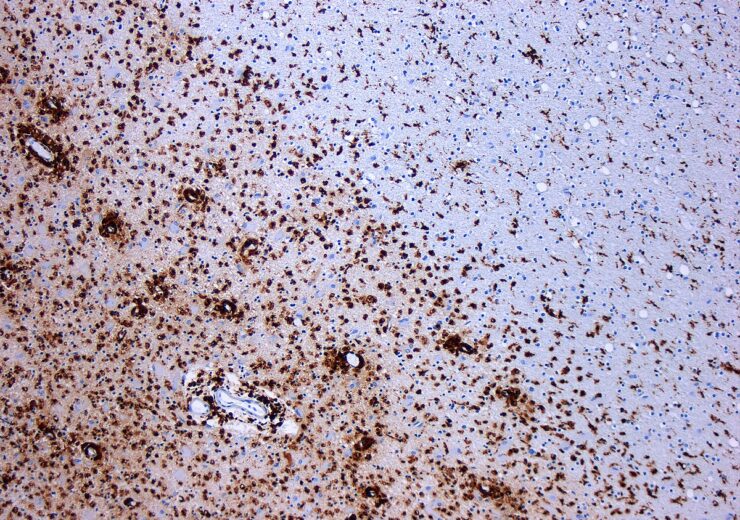In the trial, the number of new gadolinium-enhancing (GdE) T1-lesions was lowered by 89% and 79% in the higher- and lower-dose treatment arms, respectively, compared with the placebo

A photomicrograph of a demyelinating MS-Lesion. (Credit: Marvin 101 from Wikimedia Commons)
French healthcare company Sanofi announced that its frexalimab has significantly reduced disease activity in a Phase 2 trial of patients with relapsing multiple sclerosis (MS).
Frexalimab is a new second-generation investigational anti-CD40L monoclonal antibody. It blocks the costimulatory CD40/CD40L cellular pathway necessary for adaptive and innate immune cell activation and function, without lymphocyte depletion.
According to the positive Phase 2 data, the number of new gadolinium-enhancing (GdE) T1-lesions was lowered by 89% and 79% in the higher- and lower-dose treatment arms, respectively, compared with the placebo.
The results thus met the Phase 2 study’s primary endpoint.
Sanofi Neurology Development global head Erik Wallström said: “Building on our 20 years of research and development in multiple sclerosis, we are committed to growing our robust pipeline of MS therapies by exploring multiple treatment approaches with unique MOAs that have the potential to slow or halt disability, which remains one of the greatest unmet medical needs in multiple sclerosis today.”
The Phase 2 trial is said to be a randomised, double-blind, placebo-controlled trial with the goal to assess the monoclonal antibody in patients with relapsing MS.
It randomised 129 patients to dose either higher or lower doses of frexalimab or a matching placebo for 12 weeks (Part A). After completion of 12 weeks, patients receiving placebo switched to respective frexalimab arms and entered the ongoing open-label Part B.
Sanofi said that the primary endpoint was the reduction in the number of new GdE T1-hyperintense MRI brain lesions after 12 weeks.
The secondary endpoints consist of additional Magnetic resonance imaging (MRI)-based efficacy measures along with the safety, tolerability and pharmacokinetics of the monoclonal antibody.
As per the findings, the therapy was well-tolerated, and 125 patients completed Part A and continued to the open-label Part B.
The healthcare company is planning to start pivotal trials in multiple sclerosis in early 2024.
In April this year, Sanofi launched AVAXIM Junior in the UK for active immunisation against infection caused by the Hepatitis A virus in children aged 1-15 years.
